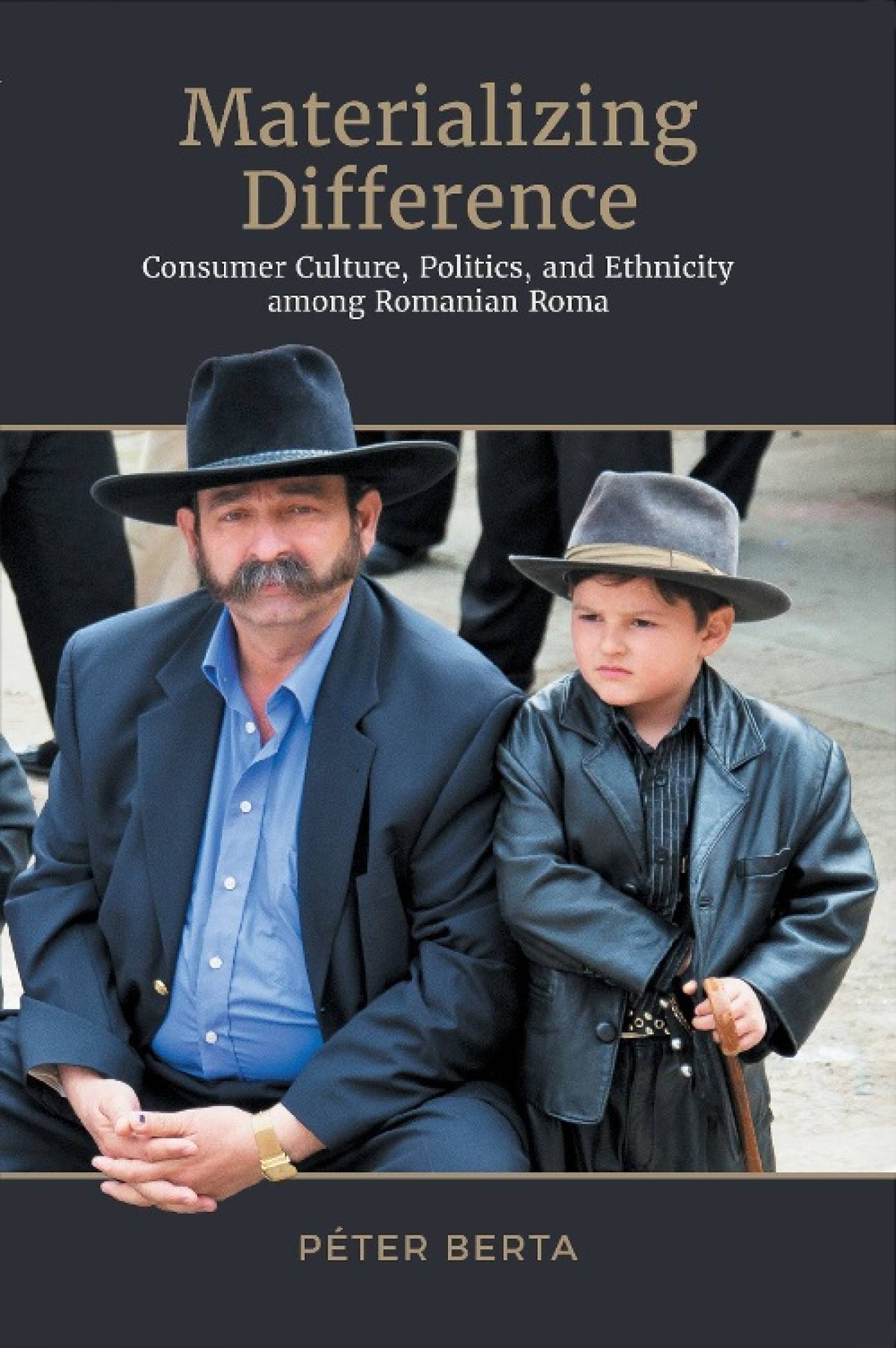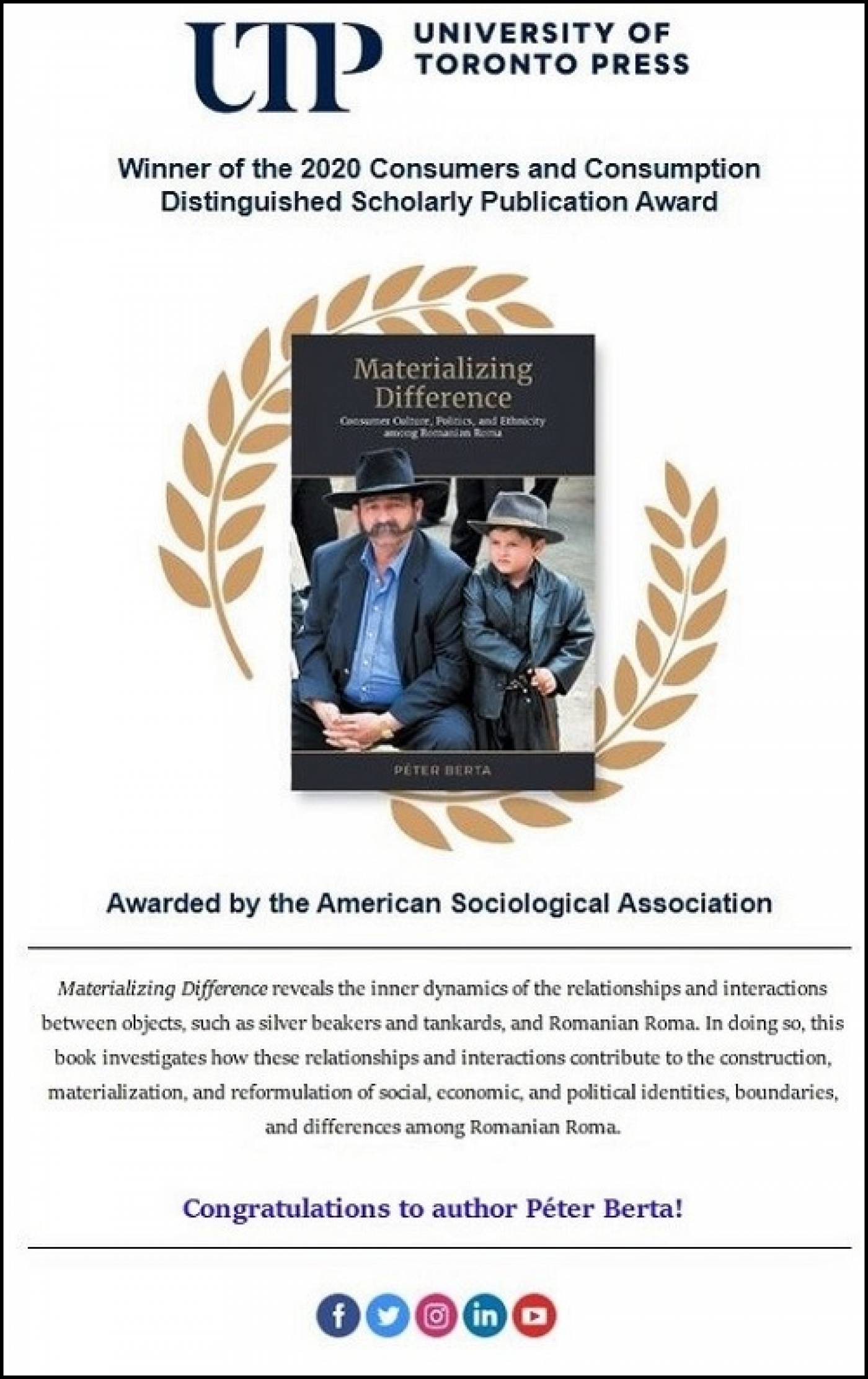Péter is a social scientist focusing on Central and Eastern Europe, especially Romania and Hungary. He specializes in economic and political anthropology/sociology, material culture studies, consumption studies, law and society (the politics of arranged marriage) and Romani studies.
He is a Senior Research Fellow at Budapest Business School; a staff member at the School of Slavonic and East European Studies (Politics & Sociology), University College London; an Associate Member at Transnational Spaces: Migration Research Unit (UCL, Department of Geography); and an Affiliate Member at the Centre for Comparative Studies of Emerging Economies (UCL, SSEES).
(1) Péter has recently published a monograph titled Materializing Difference: Consumer Culture, Politics, and Ethnicity among Romanian Roma with the University of Toronto Press (2019; with a foreword by Fred R. Myers; 390 pages + 34 colour photographs). For reviews and chapters, please see
https://utorontopress.com/us/materializing-difference-4 or
https://www.peterberta2019.com/books
Materializing Difference won the 2020 Distinguished Scholarly Publication Award from the Sociology of Consumers and Consumption Section of the American Sociological Association. Please see
https://www.asanet.org/communities-sections/sections/current-sections/co...
For an ASA interview, please see: https://asaconsumers.wordpress.com/2021/03/16/2821/
Materializing Difference received an honourable mention from the committee for the 2021 Society for Romanian Studies Book Prize. Please see https://society4romanianstudies.org/awards-prizes/
Short description of the book:
How do consumer goods and practices shape and mediate human relationships? In what ways do these goods and practices possess social, economic or political agency? What role does consumer culture – especially luxury consumption, as well as commodity aesthetics, biographies and ownership histories – play in the production of social and political identities, differences and hierarchies? How do (informal) consumer subcultures of collectors organize and manage themselves? Drawing on theories from economic and political anthropology/sociology, consumption studies and new material culture studies, Materializing Difference addresses these questions via analysis of the practices and ideologies connected to Gabor Roma beakers and roofed tankards made of antique silver. The consumer subculture organized around these objects – defined as ethnicized and gendered luxury goods by the Gabor Roma living in Romania – is a contemporary, second-hand culture based on patina-oriented consumption.
Materializing Difference reveals the inner dynamics of the complex relationships and interactions between luxury goods and their consumers as well as among consumers themselves and investigates how these relationships and interactions contribute to the construction, materialization and reformulation of social, economic and political identities, boundaries and differences. On a more theoretical level, it demonstrates that agency is not an exclusive attribute of the world of either subjects or things – these two spheres are created and acquire social meanings and significance in the context of the interactions arising between them, and therefore subjects and things are simultaneously products and producers of these interactions, as well as of each other. Materializing Difference also discusses how, after 1989, the political transformation in Romania led to the emergence of a new, post-socialist consumer sensitivity among the Gabor Roma, and how this sensitivity reshaped the pre-regime change patterns, meanings and value preferences of luxury consumption.
Materializing Difference has been reviewed in journals such as American Anthropologist 2021 (Jerome M. Levi); American Ethnologist 2021 (Andria D. Timmer); American Journal of Sociology (2021, Fiona Greenland); Anthropological Forum: A Journal of Social Anthropology and Comparative Sociology 2021 (Erin B. Taylor); The British Journal of Sociology 2021 (Clayton Childress); Collections: A Journal for Museum and Archives Professionals 2021 (Agota Abran); Consumption Markets & Culture 2020 (Ela Veresiu); Contemporary Sociology 2021 (Joel Stillerman); Departures in Critical Qualitative Research 2020 (Adina Schneeweis); Ethnic Studies Review 2021 (Simina Dragoș); Ethnos: Journal of Anthropology 2020 (Ada Ingrid Engebrigtsen); European Journal of Cultural and Political Sociology 2021 (Liviu Chelcea); International Sociology 2021 (Jeremy Morris); Journal of Anthropological Research 2020 (Cristina A. Pop); Journal of Consumer Culture 2021 (Alanna Cant); Journal of Contemporary Central and Eastern Europe 2020 (Raluca Bianca Roman); Journal of European Studies 2021 (Stephen Pogany); Material Culture 2021 (Leah Valtin-Erwin); Nations and Nationalism 2020 (Nemeth J. David); Slavic Review 2020 (Adriana Helbig); Social Anthropology 2020 (Iryna Skubii); Social Identities 2021 (Yulia Karpova).
(2) Péter has established a book series entitled The Politics of Marriage and Gender: Global Issues in Local Contexts. The series is published by Rutgers University Press and edited by Péter. The intention of this series is to fill a gap in research by examining the politics of marriage and related practices, ideologies and interpretations, and to address the key question of how the politics of marriage has affected social, cultural and political processes, relations and boundaries. The series will look at the multilevel relationships between the politics of marriage and gender, ethnic, national, religious, racial and class identities, and will analyse how these relationships contribute to the development and management of social and political differences, inequalities and conflicts.
(3) Péter’s current research – titled Contextualizing Power, Law, and Culture: The Politics of Arranged Marriage among Romanian Roma – focuses on the politics of arranged marriage among the Gabor Roma living in Romania. The project aims to give a detailed critical analysis of the European media, human rights and political discourses dealing with the presumed motivations and consequences of arranged marriage among Roma and it also examines the ideologies the Gabor Roma use to justify and rationalize the political, social and cultural significance of arranged marriage interpreted as an essential and inalienable component of their collective cultural heritage, ethnic identity and belonging. The project pays special attention to the complex interactions between transnational economic migration, intraethnic politics of difference and arranged marriage, and to the inner dynamics of the legal classification struggles between Gabor Roma customary law and European Union/Romanian state/church laws. In short, the project aims to reveal the changing ideologies, practices and strategies through which a translocal post-socialist informal economy – the Gabor Roma market of arranged marriages – works and flourishes despite the formal disapproval and prohibition represented by the laws of the Romanian state, the Seventh-Day Adventist Church and the European Union. The first results of the research will be available in Arranged Marriage: The Politics of Tradition, Resistance, and Change, a volume edited by Péter and to be published by Rutgers University Press in 2022.
(4) Péter is currently involved in the Global Informality Project headed by Prof. Alena Ledeneva.
 Close
Close




